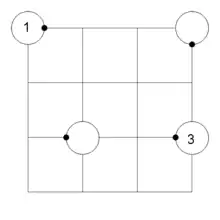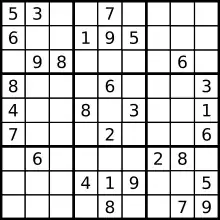Nikoli (publisher)
Nikoli Co., Ltd. (Japanese: 株式会社ニコリ, Hepburn: Kabushiki-gaisha, Nikori) is a Japanese publisher that specializes in games and, especially, logic puzzles. Nikoli is also the nickname of a quarterly magazine (whose full name is Puzzle Communication Nikoli) issued by the company in Tokyo.[1] Nikoli was established in 1980[1] and became prominent worldwide with the popularity of Sudoku.
| Founded | 1980 |
|---|---|
| Founder | Maki Kaji |
| Country of origin | Japan |
| Publication types | Puzzles, Magazines |
| Official website | nikoli |
The name "Nikoli" comes from the racehorse who won the Irish 2,000 Guineas in 1980; the founder of Nikoli, Maki Kaji, was fond of horseracing and betting.[2]
Nikoli's claim to fame is its vast library of "culture independent" puzzles. An example of a language/culture-dependent genre of puzzle would be the crossword, which relies on a specific language and alphabet. For this reason Nikoli's puzzles are often purely logical, and often numerical.
Nikoli's Sudoku, the most popular logic problem in Japan,[3] was popularized in the English-speaking world in 2005, though that game has a history stretching back hundreds of years and across the globe.[4]
The magazine has invented several new genres of puzzles, and introduced several new games to Japan.
Nikoli puzzles



Some of the popular Nikoli puzzles, along with their Japanese names; terms in parentheses are published English titles for the same puzzles.
- Bag (バッグ, baggu) (Corral)
- Connect the dots (点つなぎ, ten tsunagi) (dot to dots)
- Country Road (カントリーロード, kantorī rōdo)
- Crossword (クロスワードパズル, kurosuwādo pazuru)
- Cipher crossword (ナンクロ, nankuro)
- Edel (エデル, ederu) (Paint by Numbers, Nonogram, Griddler)
- Fillomino (フィルオミノ, firuomino) (Allied Occupation)
- Gokigen Naname (ごきげんななめ, gokigen naname) (Slant)
- Goishi Hiroi (碁石ひろい, goishi hiroi) (Go Stones)
- Hashiwokakero (橋をかけろ, hashi o kakero) (Bridges)
- Heyawake (へやわけ, heyawake)
- Hitori (ひとりにしてくれ, hitori ni shitekure)
- Hotaru Beam (ホタルビーム, hotaru bīmu)
- Inshi no heya (因子の部屋, inshi no heya)
- Kakuro (カックロ, kakkuro) (Cross Sums, Kakro)
- Keisuke (ケイスケ, keisuke)
- Kin-Kon-Kan (キンコンカン, kinkonkan)
- Kuromasu (黒マスはどこだ, kuromasu wa dokoda)
- Light Up (美術館, bijutsukan)
- LITS (ヌルオミノ, nuruomino)
- Mainarizumu (マイナリズム, mainarizumu)
- Masyu (ましゅ, mashu)
- Maze (迷路, meiro)
- Picture maze (浮き出し迷路, ukidashi meiro)
- Mochikoro (モチコロ, mochikoro)
- Numberlink (ナンバーリンク, nanbā rinku)
- Nurikabe (ぬりかべ, nurikabe) (Cell Structure)
- Reflect Link (リフレクトリンク, refurekuto rinku)
- Ripple Effect (波及効果, hakyū kōka)
- Shakashaka (シャカシャカ, shakashaka)
- Shikaku (四角に切れ, shikaku ni kire) (Divide by Squares)
- Slitherlink (スリザーリンク, surizā rinku) (Fences)
- Stained Glass (ステンドグラス, sutendo gurasu)
- Sto-stone (ストストーン, sutosutōn)
- Sudoku (数独, sūdoku) (Number Place, Nine Numbers)
- Tatamibari (タタミバリ, tatami bari)
- Tatebo-Yokobo (タテボーヨコボー, tatebō yokobō)
- Tentai Show (天体ショー, tentai shō) (Galaxies)
- Tile Paint (タイルペイント, tairu peinto)
- Verbal arithmetic (ふくめん算, fukumensan) (Alphametics, Cryptarithm)
- Word search (シークワーズ, shīku wādo) (Word seek)
- Yajilin (ヤジリン, yajirin) (Arrow Ring)
- Yajisan-Kazusan (やじさんかずさん, yajisan kazusan)
References
| Part of a series on |
| Puzzles |
|---|
 |
- "Puzzles". Nikoli. Retrieved 2018-01-04.
- Bellos, Alex (2017). Puzzle Ninja. Guardian Books and Faber & Faber Ltd. p. 3. ISBN 978-1-4521-7105-0.
- "Nikoli Co.". Archived from the original on 2008-04-12. Retrieved 2008-04-23.
- Pegg, Ed Jr. (2005-09-15). "Ed Pegg Jr.'s Math Games: Sudoku Variations". MAA Online. The Mathematical Association of America. Archived from the original on 2006-10-13. Retrieved 2006-10-03.